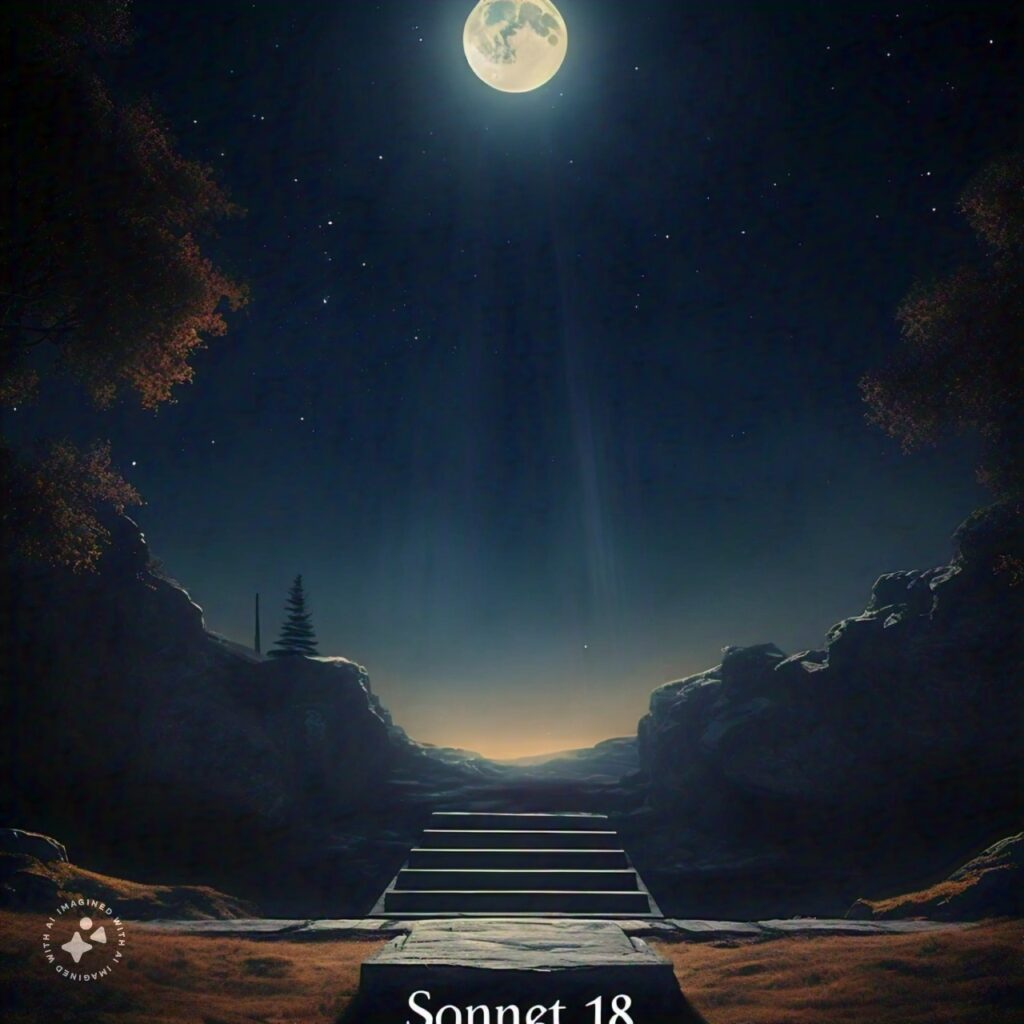Enter the enchanting world of Shakespeare’s poetry, where words whisper secrets of the soul and emotions unfold like a symphony. For centuries, his masterpieces have captivated us with their intimate revelations and exquisite beauty. Join us on a journey through his most iconic works, where love, beauty, and mortality converge in unforgettable verse.
Sonnet 18
Shall I Compare Thee to a Summer’s Day?
Shall I compare thee to a summer’s day?
Thou art more lovely and more temperate:
Rough winds do shake the darling buds of May,
And summer’s lease hath all too short a date:
Sometime too hot the eye of heaven shines,
And often is his gold complexion dimm’d;
And every fair from fair sometime declines,
By chance or nature’s changing course untrimm’d;
But thy eternal summer shall not fade
Nor lose possession of that fair thou owest;
Nor shall Death brag thou wander’st in his shade,
When in eternal lines to Time thou growest:
So long as men can breathe or eyes can see,
So long lives this and this gives life to thee.

Sonnet 18 is a love poem that compares the beloved to a summer’s day. Shakespeare argues that the beloved is even more beautiful and lovely than a summer’s day, which is usually associated with warmth and beauty. However, he notes that summer days can be too hot, windy, and short-lived. In contrast, the beloved’s beauty will never fade or die. It will live on forever, even when they are gone. The poem ends by saying that as long as people can read and appreciate the poem, the beloved’s beauty will be remembered and celebrated. Through this poem, Shakespeare declares the timeless beauty of his beloved, which will be preserved forever. This sonnet is a tribute to the enduring power of beauty and art, and its words continue to captivate readers to this day.

Sonnet 130
My Mistress’ Eyes”
“My mistress’ eyes are nothing like the sun;
Coral is far more red than her lips’ red:
If snow be white, why then her breasts are dun;
If hairs be wires, black wires grow on her head.
I have seen roses damask’d, red and white,
But no such roses see I in her cheeks;
And in some perfumes is there more delight
Than in the breath that from my mistress reeks.
I love to hear her speak, yet well I know
That music hath a far more pleasing sound;
I grant I never saw a goddess go;
My mistress, when she walks, treads on the ground.
And yet, by heaven, I think my love as rare
As any she belied with false compare.”
Sonnet 130, also known as “My Mistress’ Eyes,” is a poem that challenges the traditional conventions of love poetry. The speaker describes his mistress’ eyes as “nothing like the sun,” her hair as “black wires,” and her breasts as “dun” (dull). He acknowledges that her voice is not music to his ears and that her smell is not sweet. However, despite these unconventional descriptions, the speaker declares his love for her, stating that he finds beauty in her uniqueness. The poem is a satire of the exaggerated language used in traditional love poetry, showing that true love is not about physical beauty but about the beauty within. The final couplet, “And yet, by heaven, I think my love as rare / As any she belied with false compare,” drives home the message that true love is rare and valuable, even if it doesn’t conform to societal standards.
Sonnet 29
When in Disgrace with Fortune and Men’s Eyes
“When in disgrace with fortune and men’s eyes
I all alone beweep my outcast state,
And trouble deaf heaven with my bootless cries,
And look upon myself and curse my fate,
Wishing me like to one more rich in hope,
Featured like him, like him with friends possessed,
Desiring this man’s art and that man’s scope,
With what I most enjoy contented least;
Yet in these thoughts myself almost despising,
Haply I think on thee, and then my state,
Like to the lark at break of day arising
From sullen earth, sings hymns at heaven’s gate;
For thy sweet love remembered such wealth brings
That then I scorn to change my state with kings.

Sonnet 29 is a classic example of Shakespeare’s ability to capture deep emotional states. In this sonnet, the speaker begins by expressing feelings of isolation and despair. He feels out of favor with both fortune and people, laments his misfortunes, and envies others who he perceives as more hopeful, more skilled, and more loved.However, the tone shifts dramatically in the third quatrain. The speaker’s mood lifts when he thinks of a beloved person (“thee”). This thought brings such joy that it transforms his entire perspective, akin to a lark singing at dawn. The speaker’s love is so fulfilling that it makes him feel wealthy and content, to the point where he would not trade places with a king.This sonnet explores themes of self-worth, envy, and the transformative power of love. It suggests that love can bring internal richness and joy that far surpasses material wealth or social status

Sonnet 116
Let Me Not to the Marriage of True Minds”
“Let me not to the marriage of true minds
Admit impediments. Love is not love
Which alters when it alteration finds,
Or bends with the remover to remove.
O no, it is an ever-fixed mark
That looks on tempests and is never shaken;
It is the star to every wandering bark,
Whose worth’s unknown, although his height be taken.
Love’s not Time’s fool, though rosy lips and cheeks
Within his bending sickle’s compass come;
Love alters not with his brief hours and weeks,
But bears it out even to the edge of doom.
If this be error and upon me proved,
I never writ, nor no man ever loved.
Sonnet 116 is a classic definition of true love. The speaker begins by arguing that true love is not changed by time or circumstance, but remains constant and true. They define love as a guiding star that navigates the challenges of life, and declare that it is the only thing that will last forever. The tone shifts as the speaker realizes the beauty and power of true love, and the promise they make to cherish it. This sonnet explores themes of true love, constancy, and the enduring power of the human spirit.
The Phoenix and the Turtle
Let the bird of loudest lay
On the sole Arabian tree
Herald sad and trumpet be,
To whose sound chaste wings obey.
But thou shrieking harbinger,
Foul precurrer of the fiend,
Augur of the fever’s end,
To this troop come thou not near.
From this session interdict
Every fowl of tyrant wing,
Save the eagle, feather’d king;
Keep the obsequy so strict.
Let the priest in surplice white,
That defunctive music can,
Be the death-divining swan,
Lest the requiem lack his right.
And thou treble-dated crow,
That thy sable gender mak’st
With the breath thou giv’st and tak’st,
‘Mongst our mourners shalt thou go.
Here the anthem doth commence:
Love and constancy is dead;
Phoenix and the Turtle fled
In a mutual flame from hence.
So they lov’d, as love in twain
Had the essence but in one;
Two distincts, division none:
Number there in love was slain.
Hearts remote, yet not asunder;
Distance and no space was seen
‘Twixt this Turtle and his queen:
But in them it were a wonder.
So between them love did shine
That the Turtle saw his right
Flaming in the Phoenix’ sight:
Either was the other’s mine.
Property was thus appalled
That the self was not the same;
Single nature’s double name
Neither two nor one was called.
Reason, in itself confounded,
Saw division grow together,
To themselves yet either neither,
Simple were so well compounded;
That it cried, “How true a twain
Seemeth this concordant one!
Love has reason, reason none,
If what parts can so remain.”
Whereupon it made this threne
To the Phoenix and the Dove,
Co-supremes and stars of love,
As chorus to their tragic scene

The Phoenix and the Turtle is a rich exploration of the complexities of love and mortality. The speaker begins by describing the phoenix’s breathtaking beauty and its unique ability to be reborn from its own ashes. They then lament the loss of this love, as the phoenix’s rebirth means it must leave its beloved turtle dove behind. The tone shifts as the speaker realizes the beauty of this fleeting love, and the promise they make to cherish its memory. This poem explores themes of love, beauty, mortality, and the fleeting nature of life.

Sonnet 55
Not Marble Nor The Gilded Monuments
“Not marble nor the gilded monuments
Of princes shall outlive this powerful rhyme;
But you shall shine more bright in these contents
Than upswept stone, besmear’d with sluttish time.
When wasteful war shall statues overturn,
And broils root out the work of masonry,
Nor Mars his sword nor war’s quick fire shall burn
The living record of your memory.
‘Gainst death and all-oblivious enmity
Shall you pace forth; your praise shall still find room
Even in the eyes of all posterity
That wear this world out to the ending doom.
So, till the judgment that yourself arise,
You live in this, and dwell in lovers’ eyes.”
Sonnet 55 is a triumphant celebration of the power of art. The speaker begins by acknowledging the transience of physical structures and the fleeting nature of human achievement. However, they argue that a poem can last forever, transcending time and mortality. The tone shifts as the speaker realizes the impact their words can have, and the promise they make to their beloved to preserve their love through verse. This sonnet explores themes of art, legacy, and the timeless nature of love.
Sonnet 30
“When to the Sessions of Sweet Silent Thought”
“When to the sessions of sweet silent thought
I summon up remembrance of things past,
I sigh the lack of many a thing I sought,
And with old woes new wail my dear time’s waste.
Then can I drown an eye, unused to flow,
For precious friends hid in death’s dateless night,
And weep afresh love’s long-since-cancelled woe,
And moan the expense of many a vanished sight.
Then can I grieve at grievances foregone,
And heavily from woe to woe tell o’er
The sad account of fore-bemoaned moan,
Which I new pay as if not paid before.
But if the while I think on thee, dear friend,
All losses are restored and sorrows end.”

Sonnet 30 is a poignant exploration of memory and nostalgia. The speaker begins by reminiscing about past loves and losses, and how those memories still affect them today. They acknowledge the pain of remembering, but also the beauty of having experienced love. The tone shifts as the speaker realizes that their memories are a treasure trove of emotions, and that love never truly fades away. This sonnet explores themes of memory, loss, and the enduring power of love.

Sonnet 138
When my love swears that she is made of truth
When my love swears that she is made of truth,
I do believe her, though I know she lies,
When my love swears that she is made of truth,
That she might think me some untutored youth,
Unlearnèd in the world’s false subtleties.
Thus vainly thinking that she thinks me young,
Although she knows my days are past the best,
Simply I credit her false-speaking tongue:
On both sides thus is simple truth suppressed.
But wherefore says she not she is unjust?
And wherefore say not I that I am old?
Oh, love’s best habit is in seeming trust,
And age in love loves not to have years told.
Therefore I lie with her and she with me,
And in our faults by lies we flattered be.
Sonnet 138 is a nuanced exploration of the complexities of love and relationships. The speaker begins by acknowledging the flaws and deceptions that exist in love, but argues that it’s worth it for the joy it brings. They acknowledge the imperfections of their beloved, but choose to love them anyway. The tone shifts as the speaker realizes the beauty of imperfect love, and the promise they make to cherish it. This sonnet explores themes of love, relationships, and the beauty of imperfection.
Sonnet 60
Like As The Waves Make Towards The Pebbled Shore
Like as the waves make towards the pebbled shore,
So do our minutes hasten to their end;
Each changing place with that which goes before,
In sequent toil all forwards do contend.
Nativity, once in the main of light,
Crawls to maturity, wherewith being crown’d,
Crooked eclipses ‘gainst his glory fight,
And Time that gave doth now his gift confound.
Time doth transfix the flourish set on youth
And delves the parallels in beauty’s brow,
Feeds on the rarities of nature’s truth,
And nothing stands but for his scythe to mow:
And yet to times in hope my verse shall stand,
Praising thy worth, despite his cruel hand.

Sonnet 60 is a contemplative exploration of the passage of time. The speaker begins by observing the movement of waves and the way time slips away. They acknowledge the impermanence of all things, including beauty and love. However, the tone shifts as the speaker finds comfort in the present moment, and the beauty that still exists. This sonnet explores themes of time, impermanence, and the importance of living in the moment.

Sonnet 71
No longer mourn for me when I am dead.
No longer mourn for me when I am dead
Than you shall hear the surly sullen bell
Give warning to the world that I am fled
From this vile world, with miserable death.
No, do not weep, for I have lived a life
In thee, my love, and in thy love I died,
And shall thy love be deathless, and thy might
Shall be the end of all my mortal strife.
When I am gone, let sorrow’s bitter sting
Be sooth’d with thoughts of thee, and let my death
Be not a period to our love’s sweet spring,
But rather an eternally growing breath.
So I, in thine embrace, shall find my peace,
And in thy love my final rest release.
Sonnet 71 is a meditation on mortality and legacy. The speaker begins by asking their beloved not to mourn their passing, but to remember them fondly. They acknowledge the inevitability of death, but argue that their love will live on. The tone shifts as the speaker realizes the impact they can have on those they leave behind, and the promise they make to be remembered through their words. This sonnet explores themes of mortality, legacy, and the enduring power of love.
In the end, it is not death that defines us, but the love we leave behind. The poet’s words remain, a testament to the enduring power of love and legacy, long after the fleeting nature of life has passed. Even in mortality, love can be immortalized, and the human spirit can transcend time and touch the divine. The sonnet’s final verse echoes through eternity, a reminder that art can capture the essence of the human experience, and the beauty of love can be preserved forever. In this way, the poet’s legacy lives on, a beacon of hope that continues to inspire and uplift generations to come.
Thank you for viewing, drop a comment if you have any recommendations on what you will like to see here.









Hey people!!!!!
Good mood and good luck to everyone!!!!!